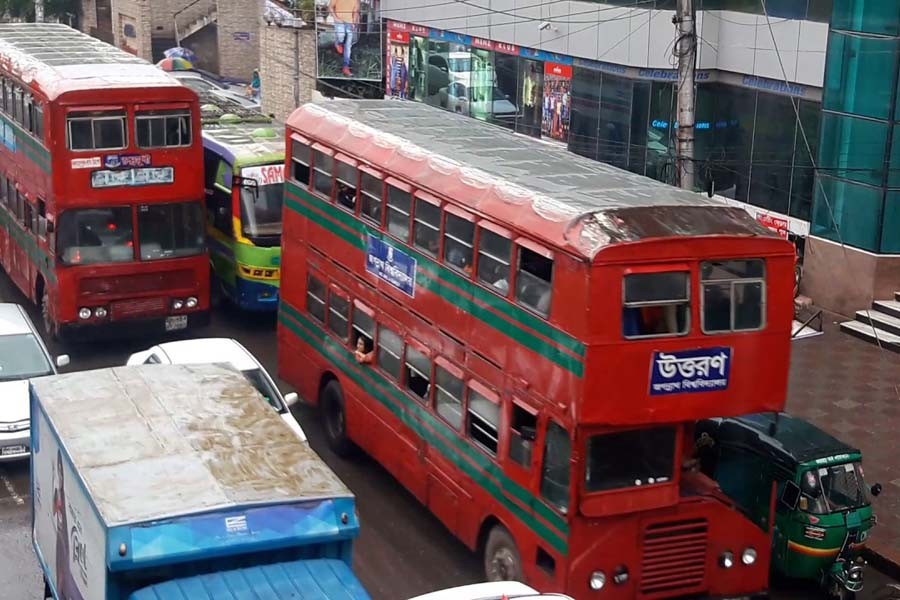As traffic anarchy in Dhaka city and road accidents across the country relentlessly continue to claim lives, a country in Europe is all set to introduce no-fare travel. Indeed, Luxembourg will be the first country in the world to abolish fare on public transport from next summer. Already young people in that country do not have to pay fare for travelling on trains, buses and trams. The other country that experimented with zero-fare travel was Estonia only to abandon the system after a few years.
Now does such a system have the potential to bring discipline in the transport system in the country or the capital city? Sure enough, Luxembourg is a small country with an area of 2,586 sq kilometres or 998 sq miles. It had a population of 576,249 in 2016. With a healthy growth rate of its population, the size of its population may now stand somewhere at 600,000. This means it is a sparsely populated country. Abolition of fare on public transport in such a country does not prove to be a daunting task. It becomes affordable also because of the fact that the country is highly developed and has one of the highest gross domestic products (GDP) per capita.
Introduction of fare-free journeys all over Bangladesh would be an outlandish idea. But perhaps a less radical system can help the capital get rid of its traffic travail. The idea of allowing only a handful of bus companies (six) to operate public buses is nothing but some modification to a centrally operated public transport system. It is an attempt to drive away some of the thugs who have established monopoly business in the transport sector.
There are more buses-unfortunately mini-buses -than the city can accommodate. Even buses of the same company compete with each other to pick up passengers from a vantage point. Lack of regulation and discipline is the compelling reason for many buses to jostle for space at pick-up points. With fewer wide-bodied and double-decker buses transportation of far more passengers than is done currently with a large number of mini-buses can be accomplished. Their movement and waiting time have to be strictly regulated.
Still there is no guarantee that bus companies operating public buses will not somehow botch up commutation in their eagerness to make the most of the rush hours. The tendency of not moving unless a bus is nearly full at the starting point cannot be changed without strict monitoring. Such buses are not expected to leave with vacant seats.
This problem can be overcome with the introduction of buses operated by the city corporations or the Bangladesh Road Transport Corporation (BRTC). Commuters may not be allowed the liberty to commute free of charge but the fare can have a minimum number of slabs and the highest ceiling for travelling within the city. Buses will continue to move stopping for a minute or so at a stop and no matter if passengers are there in wait or not the buses will maintain its schedule. This is how the everyday hassle of commuting on company-operated public buses can be avoided.
The innumerable bus companies now operating in the city have taken the travelling public a hostage. The BRTC could not introduce an acceptable fare chart on public transport. A section of buses have been deceiving passengers in the name of seating service. The authorities concerned have admitted that there is no such service. But then a committee was constituted in order to suggest if seating services can be retained and how those will operate. Overall the committee was assigned to suggest a way out of the operational indiscipline and the daily wrangle over fare.
Intriguingly, the committee submitted its recommendation almost a year back but no action has been taken so far on its recommendations. Why? Now the news is that the BRTC will import about 500-1,000 new buses. Apparently, this sounds good. But recent experiences of such procurement of new buses are not at all good. Such buses were dumped well before their active life. Maintenance of the BRTC buses is next to nothing. Whether it is deliberate or not is a matter of serious scrutiny. The world class Volvo buses with an active life of 20 years were abandoned within just eight years -some of those even earlier.
The BRTC is often viewed as a den of corruption. Without cleaning the Augean stable, import of new buses will yield no better result. To make the BRTC effective and efficient, the whole set-up should be recast and then given the sole responsibility of public transport within the city. If the state-run corporation performs the responsibility dutifully, the tailbacks on city roads can be made a thing of the past. People will be able to commute like all civilised urban societies in the world do. Either there will be ticket counters or conductors with punch machines for giving tickets and passengers will collect those voluntarily without a conductor asking for fares several times during a short journey.
Now that the BRTC is about to procure hundreds of new buses, it can import a few thousands and then take the sole responsibility of road transport within the city. When the elevated expressway will be in service, its task would be lighter. Such a radical system will give double benefit by sending the lackadaisical private buses to junk yard and reducing the city's pollution.


